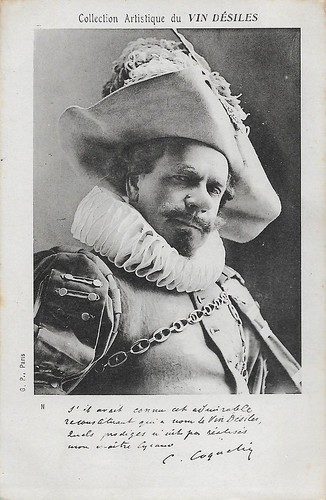
French postcard in the series Collection Artistique du Vin Désiles by S.I.P. Photo: G.P., Paris. Caption: If he had known this admirable restorative called Vin Désiles, what wonders my master Cyrano would not have achieved. C. Coquelin.
French actor Benoît-Constant Coquelin (1841-1909), known as Coquelin aîné (Coquelin senior), was one of the greatest theatrical figures of his age. He entered the Comédie-Française in 1860, became a Sociétaire in 1864, left in 1887 to go on European and American tours, and returned as a Pensionnaire between 1890 and 1892. Despite the strict rules of the Comédie to not play afterwards on other stages, Coquelin had a triumph in 1897 with Edmond Rostand's 'Cyrano de Bergerac' and would play the lead role many times. In 1900, when he was almost sixty, Coquelin toured America with Sarah Bernhardt and appeared on Broadway in 'Cyrano de Bergerac' while Bernhardt played Roxane. Back in France, they appeared in 'L'Aiglon'. For his booming voice and his lyrical and fiery temperament, Rostand wrote 'Chantecler', but the actor died in 1909 before he could perform the play.

French postcard in the series Collection Artistique du Vin Désiles by S.I.P. Photo: G.P., Paris. Caption: If he had known this admirable restorative called Vin Désiles, what wonders my master Cyrano would not have achieved. C. Coquelin.
Constant Coquelin's only film was an early sound film shot by Lumiere brothers' operator Felix Mesguich in 1900, though some sources state Clement Maurice as the director. It was a duel scene from Edmond Rostand's 'Cyrano de Bergerac', the role Coquelin sr. had created in 1897. The film was shown at the Phono-Cinema Theatre in Paris during the famous 1900 Exposition. After the exposition closed, Mesguich took the films on a three-month tour all over Europe. In 1930 the film was found back, together with early sound films. In 1952 the scene was inserted in the film Cinema parlant 1900.
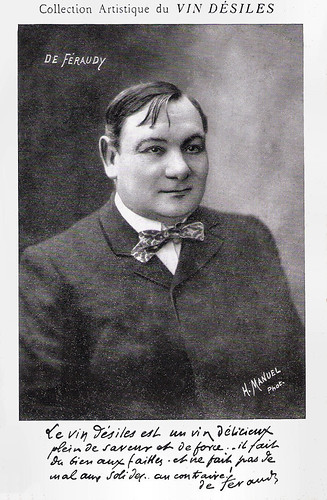
French postcard in the series Collection Artistique du Vin Désiles by S.I.P. Photo: H. Manuel. Caption: Vin Désiles is a delicious wine, full of taste and vigour. While it does well to the weak, and means no harm to the solid ones, on the contrary! de Féraudy.
Maurice de Féraudy (1859-1932) was an actor of the Comédie-Française and a French director. He was also a notable actor and director in French silent cinema. In 1908-1909, he debuted in the cinema. In the 1910s Féraudy played in films at Eclair, such as Monsieur Lecoq (Maurice Tourneur, 1914). Despite his high age, Féraudy enjoyed memorable roles in Crainquebille/Coster Bill of Paris (Jacques Feyder, 1922), the Danish film Klovne/The Clown (Anders Sandberg, 1926) with Gösta Ekman and Karina Bell, and Les Deux timides/Two Timid Souls (René Clair, 1928).
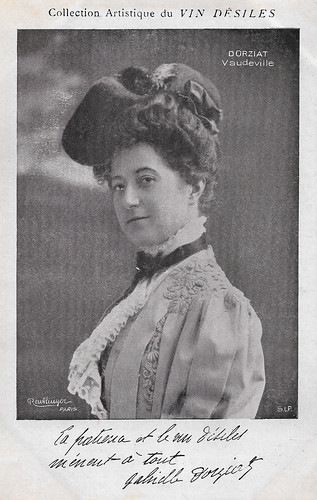
French postcard in the series Collection Artistique du Vin Désiles by S.I.P. Photo: Reutlinger, Paris. Caption: Patience and le Vin Désiles lead to everything. Gabrielle Dorziat.
French stage and film actress Gabrielle Dorziat (1880–1979) was a fashion trendsetter in Paris and helped popularise the designs of Coco Chanel. The Théâtre Gabrielle-Dorziat in Épernay, France is named for her. From 1936 onwards, she appeared in over 70 films.

French postcard in the series Collection Artistique du Vin Désiles by S.I.P. Photo: Reutlinger, Paris. Caption: I am grateful for the warm and comforting Désiles wine. Marthe Brandès, Renaissance.
French theatre actress Marthe Brandès (1862-1930) made her debut at the Théâtre du Vaudeville, then joined the Comédie-Française in 1887 and became its 333rd Sociétair from 1896 to 1903. Around 1904-1905, Marthe Brandès was active at the Théâtre de la Renaissance, in plays such as 'Amoureuse' by Georges de Porto-Riche and Jules Lemaître's plays 'La Massière' and 'Bertrade.

French postcard in the series Collection Artistique du Vin Désiles by S.I.P. Photo: Henri Manuel. Caption: Vin Désiles is the best cordial and the most powerful comforter. Suzanne Munte.
French actress Suzanne Munte (1867-1938) performed from the early 1890s in dramas on stage, becoming just as popular as Sacha Guitry, Marthe Régnier or Réjane. From 1912 Munte acted on screen too, starting with the lead in the drama Le calvaire d'un mère (Adrien Caillard, Henri Pouctal, 1912). A few more films followed, but it was only in 1918 that Munte's film career became substantial with Gaston Ravel's La maison d'argile (1918). In the 1920s, she often played supporting parts of the mothers of the protagonists.

French postcard in the series Collection Artistique du Vin Désiles by S.I.P. Photo: Paul Boyer. Caption: If I had drunk some wine earlier, I would obviously have a lot more hair left. Jean Perier, Opéra-Comique.
French singer and actor Jean Perier (1869-1954) sang principally within the operetta repertoire but also portrayed roles in operas by Wolfgang Amadeus Mozart and Giacomo Puccini. In addition to his opera career, Périer appeared in over thirty films between 1900 and 1947. His film career set off in the early 1930s, with his role as the judge in Autour d'une enquête (Henri Chomette, Robert Siodmak, 1931). He played supporting parts in Entente Cordiale (Marcel L'Herbier, 1939) and Talleyrand in Le destin fabuleux de Désirée Clary (Sacha Guitry, 1942).

French postcard in the series Collection Artistique du Vin Désiles by S.I.P. Photo: Pergné. Caption: He who invented you, excellent Vin Désiles, was the great benefactor of our humanity. Verily I say unto him, He set right in the ten thousand(s). Félix Galipaux.
French actor, playwright, and humorist Félix Galipaux (1860-1931) was known for his comic stage monologues. In 1896 or 1897, the pioneering filmmaker Charles-Émile Reynaud filmed Galipaux performing his popular routine 'Le Premier Cigare' (The First Cigar). Galipaux later acted in Le premier cigare du collégien/The First Cigar of the Schoolboy (Ferdinand Zecca, 1902) and in Le Raid Paris–Monte Carlo en automobile/An Adventurous Automobile Trip (Georges Méliès, 1905). Pathé Frères featured Galipaux in some of the first French sound films, such as La Lettre and Au Telephone (1905). In the early 1910s, Galipaux did a few more films for Pathé, including Un monsieur qui a un tic (Albert Capellani, 1911) and Gorgibus et Sganarelle (Camille de Morlhon, 1912). His last part was in the Suzanne Grandais vehicle Lorena (Georges Tréville, 1918). Méliès said that Galipaux was one of the few stage-trained actors who adapted well to the cinema, because "he knows how to make himself understood without speaking, and his movements, even if deliberately exaggerated—which is necessary for pantomime and especially for photographed pantomime—are always appropriate." Méliès also reported that it was the monologues of Galipaux and Coquelin that inspired the comic style of his own productions.
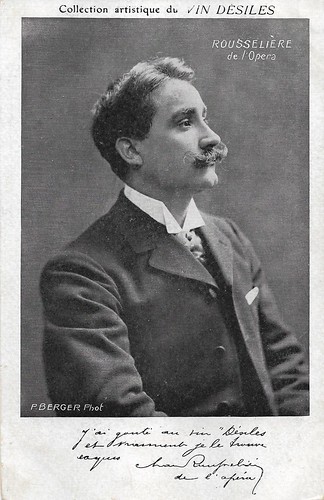
French postcard in the series Collection Artistique du Vin Désiles by S.I.P. Photo: P. Berger. Caption: I have tasted the Désiles wine and I really find it exquisite. Rousselière of l'Opéra.
French operatic tenor Charles Rousselière (1875–1950) performed primarily at the Paris Opera, the Opéra de Monte-Carlo, and the Opéra-Comique. He sang in the world premieres of several operas, including the title role in Charpentier's 'Julien' and Giorgio in Mascagni's 'Amica'. He also made numerous recordings between 1903 and 1930.
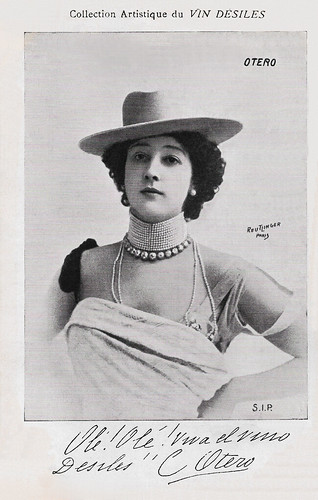
French postcard in the series Collection Artistique du Vin Désiles by S.I.P. Photo: Reutlinger, Paris. Caption: Olé! Olé! Viva el vino Desilés, C. Otero.
Carolina 'La Belle' Otéro (1868–1965) was a Spanish-born dancer, actress and courtesan.
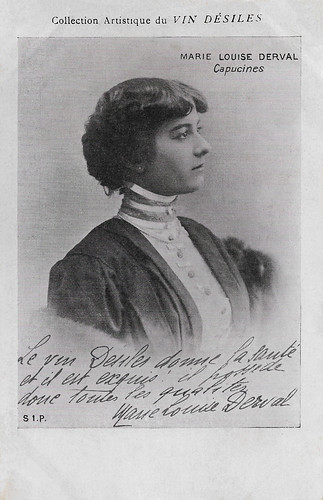
French postcard in the series Collection Artistique du Vin Désiles by S.I.P. Caption: I am grateful for the warm and comforting Désiles wine. Marie-Louise Derval, Capucines.
French stage and (silent) screen actress Marie-Louise Derval (1884-1965) peaked in the early 1910s in Pathé films by a.o. Albert Capellani and in Eclair films by Emile Chautard. In the later 1910s, she acted in many films by André Hugon for Les Films Succès.

French postcard in the series Collection Artistique du Vin Désiles by S.I.P. Photo: Reutlinger, Paris. Caption: So as not to be fragile, let's take Vin Désile. Renée Desprez, Capucines.
Renée Desprez (?-?) was a French singer, theatre and film actress, and 'élégante' of the Belle Epoque. Desprez was so popular that her photographs were used to promote fashion houses such as Agnès, Lewis, Noirat and Dœuillet, As far as known, Desprez only acted in three silent films: Les Lois du monde (Fanny Liona, 1917), L'Équipe (Maurice Lagrenée, 1922), and Cœur léger (Robert Saidreau, 1923).

French postcard in the series Collection Artistique du Vin Désiles by S.I.P. Photo: Reutlinger, Paris. Caption: This is surely a key to the dream that we ... divine (?). C. Sorel, Comédie Française.
Legendary actress Cécile Sorel (1873-1966) was the ‘queen of the French stage’ during the Belle Epoque, the period between the Paris Exposition of 1900 and the First World War. Her public appearances, often in extravagant costumes, created a sensation. During her long life, she played in five films.

French postcard in the series Collection Artistique du Vin Désiles by S.I.P. Photo: H. Manuel, Paris. Caption: Pendant une tournée le Vin Désiles soutient, réconforte - et permet de resister à la fatigue de longs voyages ou de dures traversées. Suzanne Desprès.
French actress Suzanne Desprès (1875-1951) was a vedette of the Comédie-Française. She also appeared in several silent and sound films.

French postcard in the series Collection Artistique du Vin Désiles by Ruckert & Cie. Photo: Paul Berger. Caption: Once, they constructed good furniture from the wood of the islands (des iles). Nowadays they construct a good temper with Vin Désiles. Y. de Bray of the Vaudeville.
Yvonne de Bray (1887-1954) was a French stage and screen actress, famous for her role as Sophie in Jean Cocteau's film Les parents terribles (1948). Already as a child, Yvonne de Bray started on stage alongside famous monstres sacrés of the French stage, Gabrielle Réjane, and Sarah Bernhardt. She later performed on stage in tailor-made plays by her husband, Henri Bataille. In 1922, De Bray left the stage, devastated after the death of her husband. She later starred again in two Bataille plays, 'La Tendresse' in 1924 and 'L’Animateur' in 1926. And in 1927, she played in 'Le Venin' by Henri Bernstein and in 1937 in 'Catherine Empereur' by Maurice Rostand. Jean Cocteau saw her in 'Catherine Empereur' and invited her to perform in his play 'Les Parents Terribles' the role of Sophie, which he had written especially for her. An alcohol problem prevented her from performing, so Germaine Dermoz got the part. Instead, in 1948, she would be Sophie in Cocteau's film adapted from the play, opposite Jean Marais as Michel, Josette Day as Madeleine, and Gabrielle Dorziat as Léo. Cocteau wrote the play 'Les Monstres sacrés' in which De Bray would act in 1940. From 1943 De Bray acted in several films.
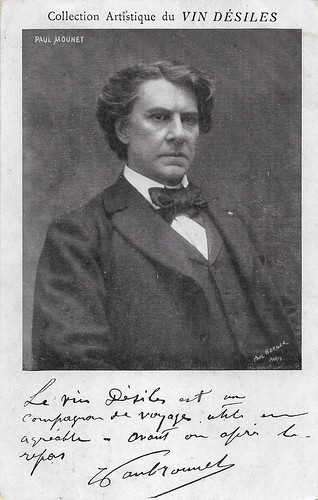
French postcard in the series Collection Artistique du Vin Désiles. Photo: Paul Berger, Paris. Caption: Vin Désiles is a useful and pleasant travel companion - before or after the meal. Paul Mounet.
Paul Mounet (1847–1922) was a French actor of the Comédie Française, who also acted in various film d'art films around 1910.
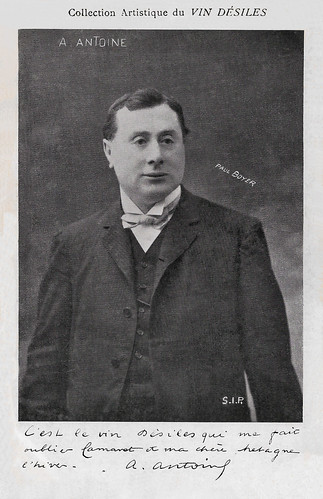
French postcard in the series Collection Artistique du Vin Désiles by S.I.P. Photo: Paul Boyer. Caption: It's the Vin Désiles that makes me forget Camaret and my dear Brittany in winter. A. Antoine.
In 1887 André Antoine (1858-1943) founded the Théâtre Libre in Paris, a workshop theatre, where plays were produced whether they would perform at the box office or not. With the help of Émile Zola, Antoine founded this private theatre association in order to manage to play socially critical plays by Zola, Henrik Ibsen, Gerhart Hauptmann, etc. and thus avoid censorship. Opposing the traditional stage acting taught by the Conservatoire, Antoine thus paved the way for Naturalism with his work and had a revolutionary effect on French theatre. During the First World War he started a career as filmmaker, under the auspices of the Société cinématographique des auteurs et gens de lettres. His first film was Les frères Corses (1917) based on the novel by Alexandre Dumas sr. and starring Henry Krauss and Romuald Joubé. This was followed by Le Coupable (1917), based on François Coppée's story and starring Joubé and René Rocher; and the fisherman tragedy Les Travailleurs de la mer (1918), shot on location at Finistère, and again with Joubé. In 1919 Antoine shot in Italy the Henri Bernstein adaptation Israël, starring Albert Collo and Vittoria Lepanto. Back in France, Antoine directed the period drama Mademoiselle de La Seiglière (1921), with Huguette Duflos in the title role, and the French Revolution drama Quatre-vingt-treize (1921), starring Philippe Garnier, Paul Capellani, and Henry Krauss. His most touching and visually appealing drama, however, is Antoine's adaptation of Zola's countryside tragedy La Terre (1921), a cruel unmasking of the countryside as background to the idyll. Antoine's two last films were L'Arlésienne (1922), starring Marthe Fabris and Gabriel de Gravone, and based on Daudet's play, and L'Hirondelle et la Mésange (1923-1924). The latter film, on life aboard barges, has a strongly documentary character, extensively showing the sites and landscapes in passing. André Antoine ended his career as a film and theatre critic.
With additional information from Marlene Pilaete. Thanks!
No comments:
Post a Comment